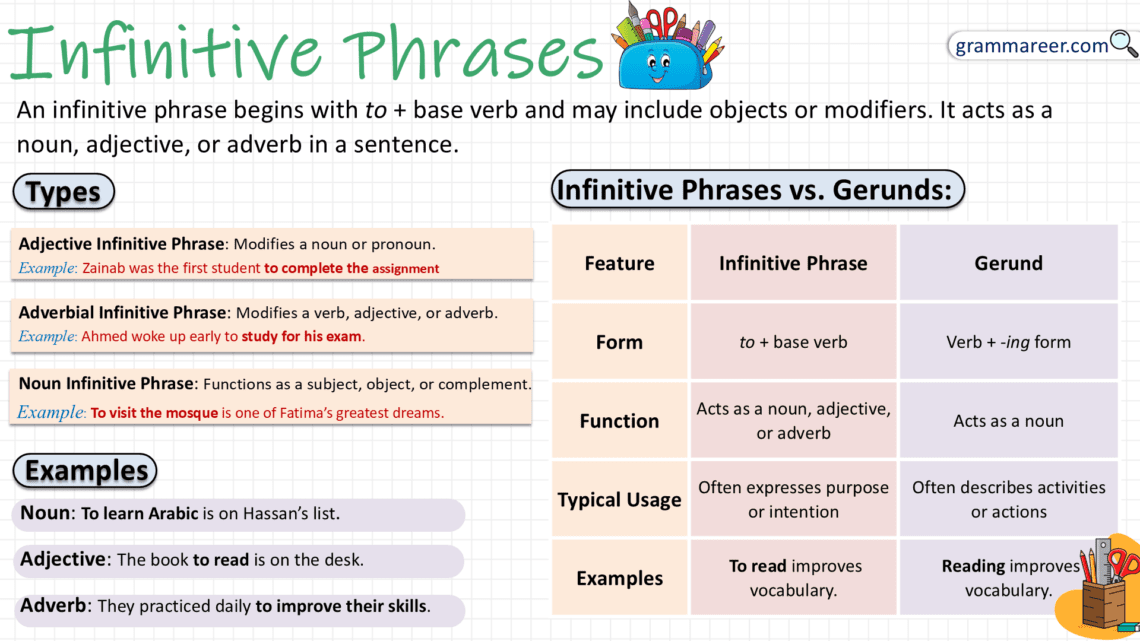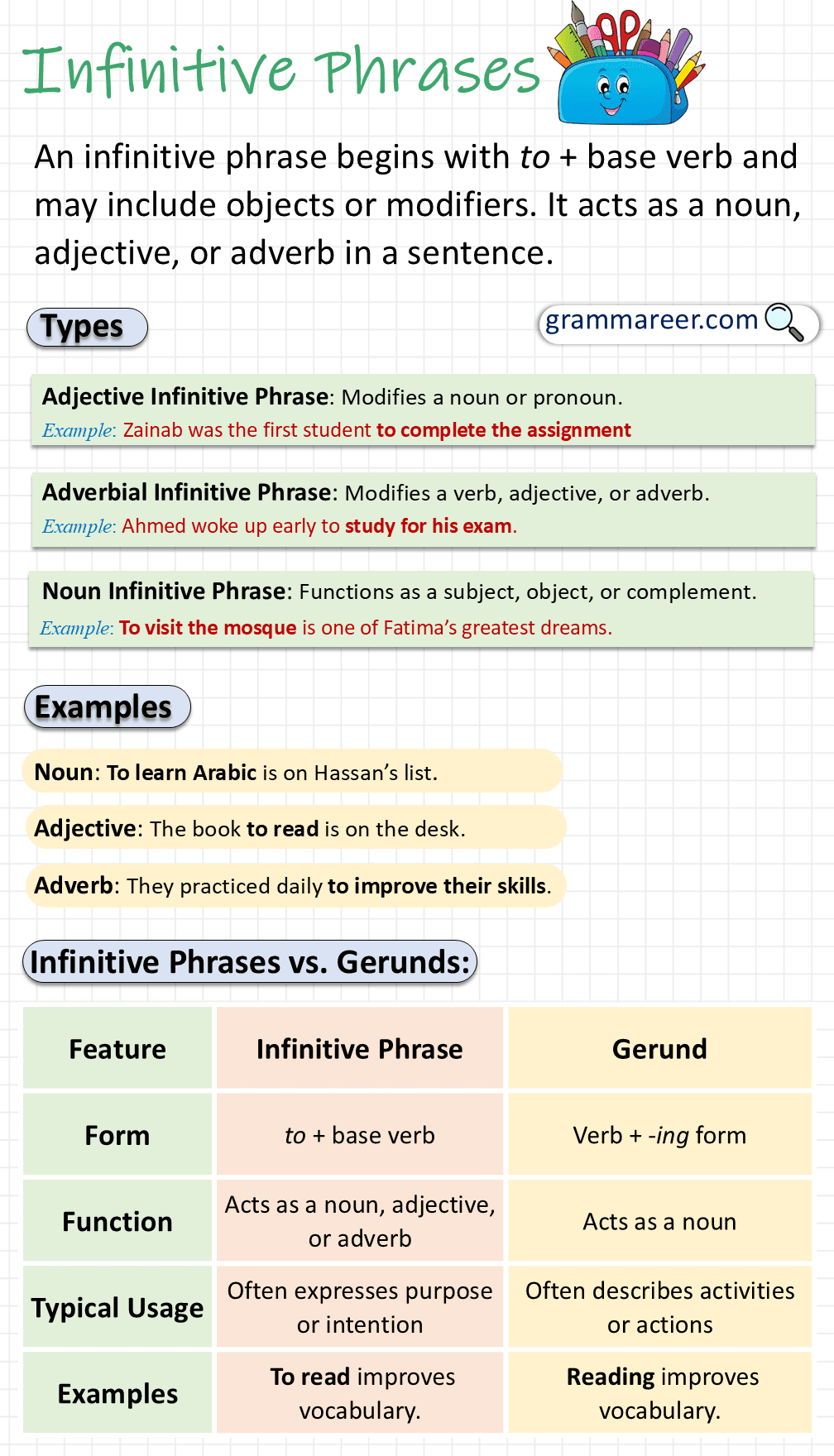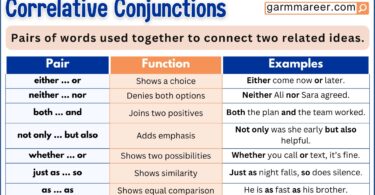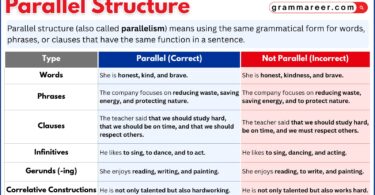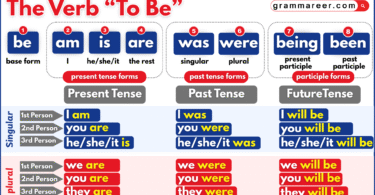An infinitive phrase is a group of words that includes an infinitive (the base form of a verb, usually preceded by “to”) and any modifiers or objects associated with it. Infinitive phrases play an important role in English grammar, allowing us to express actions, intentions, and purposes in a concise manner. In this post, we’ll explore what an infinitive phrase is, how it functions, and how you can easily identify it in sentences.
Table of Contents
What is an Infinitive Phrase?
An infinitive phrase consists of an infinitive and its accompanying words (modifiers, objects, or complements). These phrases function as nouns, adjectives, or adverbs in sentences, which means they can describe actions, people, or purposes. The structure of an infinitive phrase is simple:
- Infinitive + modifiers/objects
For example:
- To read a book (infinitive phrase acting as a noun)
- To quickly run across the field (infinitive phrase acting as an adverb)
Infinitive phrases are flexible and can appear in different parts of a sentence, depending on the function they serve.
Types of Infinitive Phrases
There are three main types of infinitive phrases: adjective infinitive phrases, adverbial infinitive phrases, and noun infinitive phrases. Each serves a distinct purpose in sentence structure.
1. Adjective Infinitive Phrases
An adjective infinitive phrase describes a noun or pronoun in the sentence, giving more information about it. These phrases function like adjectives.
Examples:
- ✅ Zainab had a book to read.
(The phrase “to read” describes the book.) - ✅ He is looking for someone to help him.
(The phrase “to help” describes the person.)
2. Adverbial Infinitive Phrases
An adverbial infinitive phrase modifies a verb, adjective, or another adverb by explaining the reason, purpose, or how something is done. These phrases function like adverbs.
Examples:
- ✅ Ali ran to catch the bus.
(The phrase “to catch the bus” explains the purpose of Ali’s action.) - ✅ She studies hard to get good grades.
(The phrase “to get good grades” explains why she studies hard.)
3. Noun Infinitive Phrases
A noun infinitive phrase acts as a noun in the sentence. It can be the subject, object, or complement of a verb or preposition.
Examples:
- ✅ To win the race is my goal.
(The phrase “to win the race” functions as the subject of the sentence.) - ✅ I want to learn English.
(The phrase “to learn English” functions as the object of the verb “want.”)
How to Identify Infinitive Phrases in a Sentence
Identifying infinitive phrases in a sentence is easy if you follow these steps:
- Look for the word “to” followed by a base form of a verb (e.g., “to write,” “to eat”).
- Check for modifiers or objects that complete the phrase (e.g., “to finish the project,” “to quickly solve the puzzle”).
- Determine the function of the infinitive phrase—whether it’s acting as a noun, adjective, or adverb.
By asking questions like “What is the action?” or “What is being described?”, you can quickly spot and understand the role of infinitive phrases in sentences.
Examples of Infinitive Phrases
Here are some examples to illustrate how infinitive phrases function in sentences:
- ✅ Sara went to the library to study for her exam.
(Adverbial infinitive phrase explaining purpose) - ✅ Omar wants to become a doctor.
(Noun infinitive phrase acting as the object of the verb “wants”) - ✅ The teacher gave the students time to finish the assignment.
(Adjective infinitive phrase describing “time”)
Infinitive Phrases vs. Gerunds
Infinitive phrases and gerunds are often confused because they both act as nouns in sentences. However, they are different in structure. A gerund is the “-ing” form of a verb that functions as a noun (e.g., “running,” “reading”). An infinitive phrase, on the other hand, uses the base form of the verb with “to” (e.g., “to run,” “to read”).
Examples:
- Gerund: ✅ Running is fun.
- Infinitive: ✅ To run is fun.
While both are correct, the gerund focuses on the action itself, while the infinitive introduces the idea of intention or purpose.
Summary
Infinitive phrases play a key role in sentence structure by acting as nouns, adjectives, or adverbs. They are easy to recognize because they always start with “to” followed by a base verb. Understanding how these phrases function in English will help you use them effectively in both writing and speaking.
Read More

